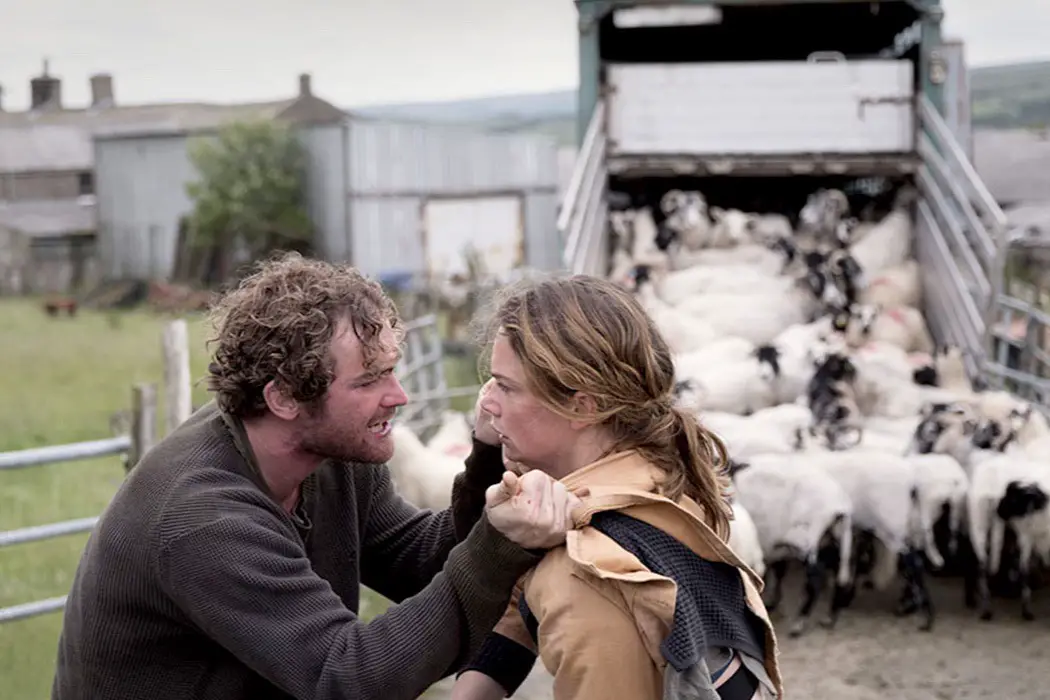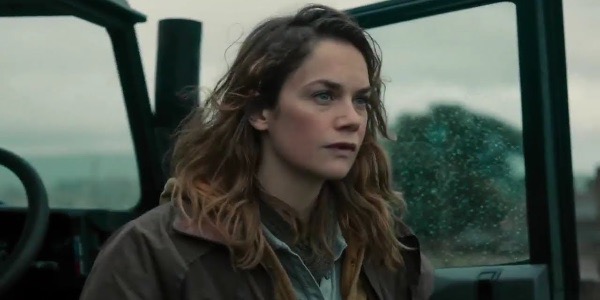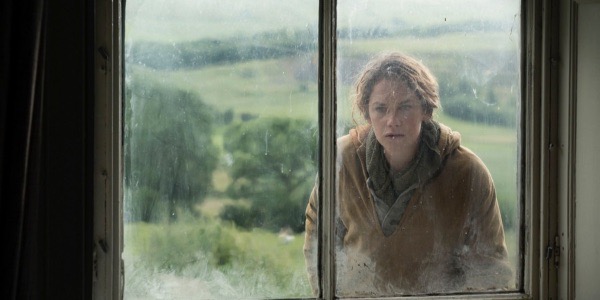DARK RIVER: Social Realism At Its Most Atmospheric

Alistair is a 25 year old writer based in Cambridge.…
Director Clio Barnard has been regularly cited as a contemporary Ken Loach, even if her films take a more aesthetically experimental look at working class life in post-Thatcher England. Her 2010 debut, The Arbor, effectively blended documentary and dramatic reconstruction by using actors to lip synch audio interviews recorded with the film’s subject, playwright Andrea Dunbar.
The Bradford council estate setting may have felt familiar to anybody who has seen a British social realist film, but the film’s execution felt completely otherworldly, announcing a distinctive new voice in British cinema.
From the city to the farmyard
After starting her career in the documentary mould (with a handful of documentary shorts to her name, prior to The Arbor), Barnard fully embraced the “new Ken Loach” tag with her 2013 effort The Selfish Giant – another Bradford set tale that reimagined Kes for David Cameron’s austerity Britain. So, after firmly embracing the conventions of the social realist drama, where does Barnard go from here?
With Dark River, the answer is simple- take the genre’s dramatic conventions and apply them to a more boldly cinematic canvas than the genre normally allows. After the straightforward aesthetics of The Selfish Giant, Barnard’s experimental streak makes a subtle return in her latest, creating a woozy, hypnotic atmosphere not commonly associated with the low-key British character drama.
After 15 years spent away from the village where she grew up, Alice (Ruth Wilson) returns in the hopes of taking ownership of the family farm she believes to be hers. Her father (Sean Bean) has recently passed away, a fact which is causing past traumas to come out in the open again – as well as amplifying tensions between her and her brother Joe (Mark Stanley) who she hasn’t spoken to for well over a decade. Under his ownership, Joe has turned a once proud farm into a run down environment; but even as he knows this fact, he’s still more than a little bit hesitant to step down.

Although Dark River feels like a natural evolution of Barnard’s filmmaking talents, it will likely prove familiar to arthouse audiences for reasons beyond her control. The rural setting and the storyline following a female protagonist returning to the farm where she grew up after a family member has passed away will instantly call to mind Hope Dickson Leach’s debut effort The Levelling from last year. Dark River was in production prior to that film’s premiere, so the similarities can’t be assessed as being anything other than surface level coincidences – but there are still remarkable similarities (in terms of both aesthetics and storytelling) that can’t go ignored.
They don’t entirely work to the detriment of Barnard’s film, often feeling like a thematic companion piece to Leach’s film from last year; factor in Francis Lee’s debut God’s Own Country, similarly set in a North Yorkshire farm, and you’ve something of a trilogy of British farmyard indies. For example, the film’s aesthetics feel like an evolutionary step in Barnard’s path as a filmmaker; the downtrodden social realism of her previous effort has been replaced by a more atmospheric soundscape and a more distinctively cinematic visual palette, courtesy of cinematographer Adriano Goldman, the former DP for Cary Fukunaga.
Familiar- but not the film’s fault
Although this is the most visually astounding of the three films I’ve referenced, the sound design isn’t as impressive due to how familiar it feels following The Levelling and God’s Own Country, which felt more unique in amplifying the disconnect of the characters through the sounds of the rural landscape. Again, this is no fault of Barnard’s own, and would be undeniably impressive were it not for the fact she’s been pipped to the post by two debutant filmmakers with similar aesthetic ideals.
Although the narrative does bare comparison to The Levelling at its most bare bones level (daughter returns to her family farm following the death of a loved one), Barnard’s film is considerably more complicated. It’s alluded throughout that she was abused by her father, which leads to Barnard’s masterstroke in the storytelling – Alice keeps bearing witness to hallucinatory flashbacks of largely inconsequential moments from her memory occurring in front of her, edited in to the drama in a manner that recalls a less stylised Lynne Ramsay or Nicolas Roeg.

The seriousness of her abused past, and the ongoing trauma it still causes her, is still hanging in the air, dealt with like a nightmare you keep trying to forget as you go about your day’s work. For a filmmaker known for documentaries and social realism, this experimentation with a dreamlike sensibility feels like an incredibly bold turning point in her career.
For the first time, Barnard’s cast is almost entirely made up of professional actors. Ruth Wilson and Mark Stanley are excellent in the lead roles, perfectly articulating the simmering tension between siblings who have never gotten along and are struggling to ignore the elephant in the room. Barnard’s casting of Sean Bean as their deceased father, glimpsed only in the aforementioned dreamlike flashbacks, feels oddly reminiscent of Terrence Malick; the most well known face in the film relegated to a supporting role is a trick straight out of that auteur’s book. I’d argue that instead of being distracting, this casting actually works and actually increases the sense of surreal unease the traumatic memories trigger within Alice.
Dark River: Conclusion
It’s been half a decade since the release of The Selfish Giant, and Clio Barnard has developed her skills as a filmmaker in the time since. Bolder and more formally inventive works likely lie in her future- but for now, Dark River feels more like a transitional gateway to better films, bridging the gap between her older social realist efforts and flirtations with experimental works likely to come.
Have you seen Dark River? How does it compare to the previous work of Clio Barnard? Tell us your thoughts in the comments below!
Dark River will be released in the UK on February23, 2018. For all international release dates, see here.
Does content like this matter to you?
Become a Member and support film journalism. Unlock access to all of Film Inquiry`s great articles. Join a community of like-minded readers who are passionate about cinema - get access to our private members Network, give back to independent filmmakers, and more.
Alistair is a 25 year old writer based in Cambridge. He has been writing about film since the start of 2014, and in addition to Film Inquiry, regularly contributes to Gay Essential and The Digital Fix, with additional bylines in Film Stories, the BFI and Vague Visages. Because of his work for Film Inquiry, he is a recognised member of GALECA, the Gay & Lesbian Entertainment Critics' Association.













